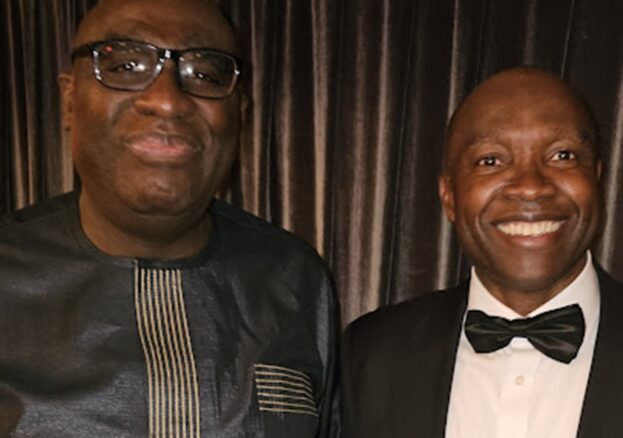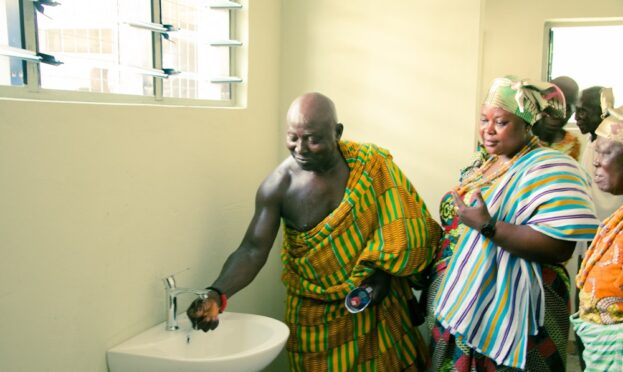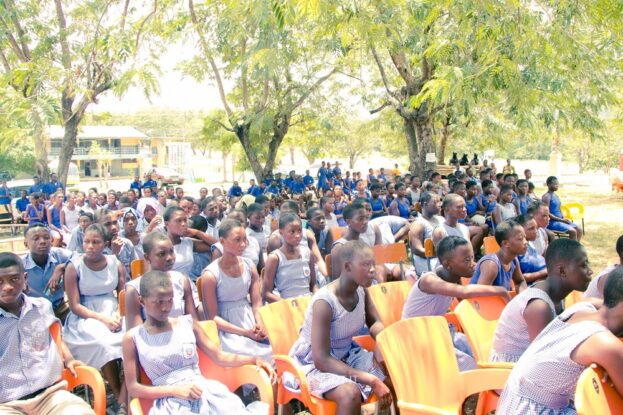
Ghanaian-born lawyer, philanthropist, author and entrepreneur Richard Acheampong, father of the first UK Children’s Parliament Prime Minister, Harry Acheamong, 12, has embarked on a transformative journey to revolutionise education across Africa.
His innovative ‘Books4Buildings’ programme, launched in partnership with the UK Children’s Parliament, aims to harness the power of storytelling to fund sustainable infrastructure projects in African schools.
The initiative kicked off with a remarkable success story at Acheampong’s alma mater, Nkonya Senior Secondary School (NKOSEC) in Ghana. Established in 1964, NKOSEC played a pivotal role in shaping Acheampong’s future. However, during a visit in December 2023, he and his wife, Joan Adwoa Asare, were dismayed by the dilapidated state of the girls’ dormitory sanitary facilities.
 “Seeing the conditions our young women were enduring was heart-wrenching,” Acheampong said. “We knew we had to act fast. NKOSEC gave me the foundation for my success, and it was time to give back.”
“Seeing the conditions our young women were enduring was heart-wrenching,” Acheampong said. “We knew we had to act fast. NKOSEC gave me the foundation for my success, and it was time to give back.”
Acheampong turned to his recently published autobiography, “Crushed But Not Destroyed,” as the catalyst for change. Investing $30,000 from the book’s proceeds, he funded the construction of a modern toilet facility for the girls’ dormitory and the completion of a long-stalled bathroom project that had languished for 12 years due to lack of funds.
The project’s swift execution is a testament to Acheampong’s business acumen. Property company, E Mensah Construction, delivered the facilities in a record 120 days – a third of the typical construction timeline – while staying within budget. This efficiency has set a new standard for infrastructure development in the region.
 “Their gift is a beacon of hope,” said NKOSEC’s Headmaster, Ernest Etornam Parku, Acheampong’s former schoolmate. “It has significantly enhanced the health, comfort, and learning environment for our female students. The Acheampongs’ prompt action, when our appeals for assistance went unanswered for years, has deeply moved us.”
“Their gift is a beacon of hope,” said NKOSEC’s Headmaster, Ernest Etornam Parku, Acheampong’s former schoolmate. “It has significantly enhanced the health, comfort, and learning environment for our female students. The Acheampongs’ prompt action, when our appeals for assistance went unanswered for years, has deeply moved us.”
But for Acheampong, this is just the beginning. ‘Books4Buildings’ is now inviting young people across Ghana to submit their story ideas. The best narratives will be published by Acheampong’s company, Flybooks, with profits earmarked for further sustainable infrastructure projects across Ghana.
“We’re unlocking creativity and building futures simultaneously,” Acheampong explained. “Every book sold will contribute to more classrooms, washrooms, libraries, or sports facilities. It’s a sustainable cycle of empowerment through education and storytelling.”
The UK Children’s Parliament, known for empowering young voices in policy-making, sees this initiative as a game-changer. “Mr. Acheampong’s vision aligns perfectly with our mission,” a spokesperson stated. “By involving children in both the creative process and the transformation of their learning environments, we’re nurturing a generation of engaged, empathetic leaders.”
This model of ‘literary-led development’ has caught the attention of educators and policymakers. Dr. Amina Salifu, an education consultant in Accra, commented, “It’s ingenious. Not only does it address urgent infrastructure needs, but it also promotes literacy, creative thinking, and a sense of ownership among students. They’re not just beneficiaries; they’re active contributors to their schools’ betterment.”
Acheampong’s initiative is timely. UNESCO reports that over 90% of children in sub-Saharan Africa attend schools lacking basic facilities. ‘Books4Buildings’ offers a replicable, community-driven solution to this crisis.
As ‘Books4Buildings’ expands, Acheampong envisions a pan-African network of schools transformed by the power of their students’ stories. “Every child has a tale to tell,” he said. “Through ‘Books4Buildings’, those tales will build classrooms, fuel dreams, and reshape the future of African education.”
